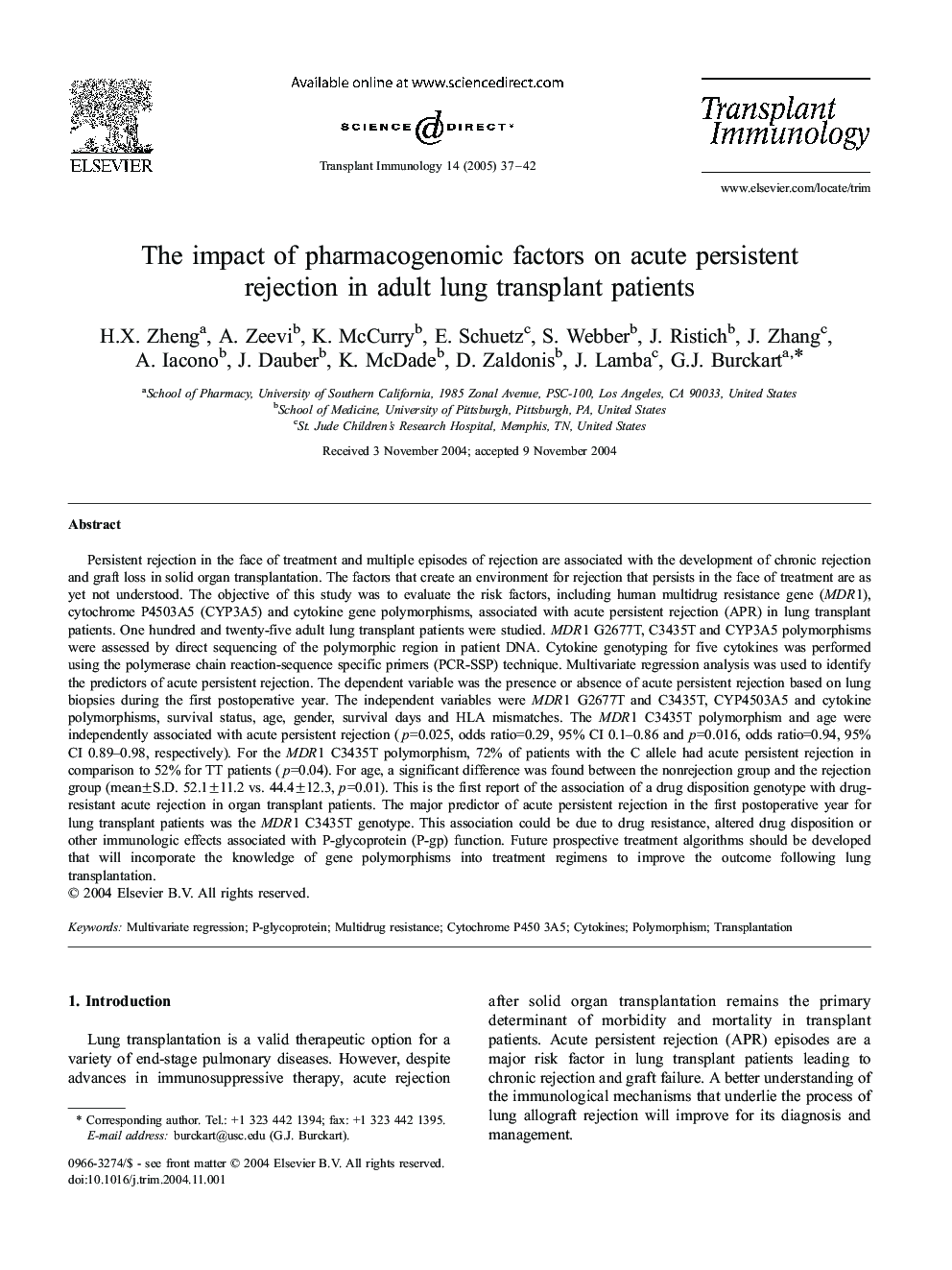| کد مقاله | کد نشریه | سال انتشار | مقاله انگلیسی | نسخه تمام متن |
|---|---|---|---|---|
| 9273759 | 1221233 | 2005 | 6 صفحه PDF | دانلود رایگان |
عنوان انگلیسی مقاله ISI
The impact of pharmacogenomic factors on acute persistent rejection in adult lung transplant patients
دانلود مقاله + سفارش ترجمه
دانلود مقاله ISI انگلیسی
رایگان برای ایرانیان
کلمات کلیدی
موضوعات مرتبط
علوم زیستی و بیوفناوری
ایمنی شناسی و میکروب شناسی
ایمونولوژی
پیش نمایش صفحه اول مقاله

چکیده انگلیسی
Persistent rejection in the face of treatment and multiple episodes of rejection are associated with the development of chronic rejection and graft loss in solid organ transplantation. The factors that create an environment for rejection that persists in the face of treatment are as yet not understood. The objective of this study was to evaluate the risk factors, including human multidrug resistance gene (MDR1), cytochrome P4503A5 (CYP3A5) and cytokine gene polymorphisms, associated with acute persistent rejection (APR) in lung transplant patients. One hundred and twenty-five adult lung transplant patients were studied. MDR1 G2677T, C3435T and CYP3A5 polymorphisms were assessed by direct sequencing of the polymorphic region in patient DNA. Cytokine genotyping for five cytokines was performed using the polymerase chain reaction-sequence specific primers (PCR-SSP) technique. Multivariate regression analysis was used to identify the predictors of acute persistent rejection. The dependent variable was the presence or absence of acute persistent rejection based on lung biopsies during the first postoperative year. The independent variables were MDR1 G2677T and C3435T, CYP4503A5 and cytokine polymorphisms, survival status, age, gender, survival days and HLA mismatches. The MDR1 C3435T polymorphism and age were independently associated with acute persistent rejection (p=0.025, odds ratio=0.29, 95% CI 0.1-0.86 and p=0.016, odds ratio=0.94, 95% CI 0.89-0.98, respectively). For the MDR1 C3435T polymorphism, 72% of patients with the C allele had acute persistent rejection in comparison to 52% for TT patients (p=0.04). For age, a significant difference was found between the nonrejection group and the rejection group (mean±S.D. 52.1±11.2 vs. 44.4±12.3, p=0.01). This is the first report of the association of a drug disposition genotype with drug-resistant acute rejection in organ transplant patients. The major predictor of acute persistent rejection in the first postoperative year for lung transplant patients was the MDR1 C3435T genotype. This association could be due to drug resistance, altered drug disposition or other immunologic effects associated with P-glycoprotein (P-gp) function. Future prospective treatment algorithms should be developed that will incorporate the knowledge of gene polymorphisms into treatment regimens to improve the outcome following lung transplantation.
ناشر
Database: Elsevier - ScienceDirect (ساینس دایرکت)
Journal: Transplant Immunology - Volume 14, Issue 1, March 2005, Pages 37-42
Journal: Transplant Immunology - Volume 14, Issue 1, March 2005, Pages 37-42
نویسندگان
H.X. Zheng, A. Zeevi, K. McCurry, E. Schuetz, S. Webber, J. Ristich, J. Zhang, A. Iacono, J. Dauber, K. McDade, D. Zaldonis, J. Lamba, G.J. Burckart,